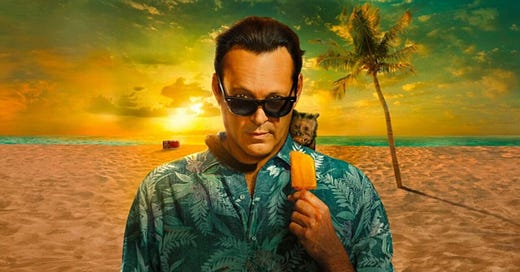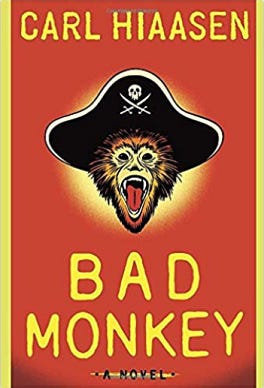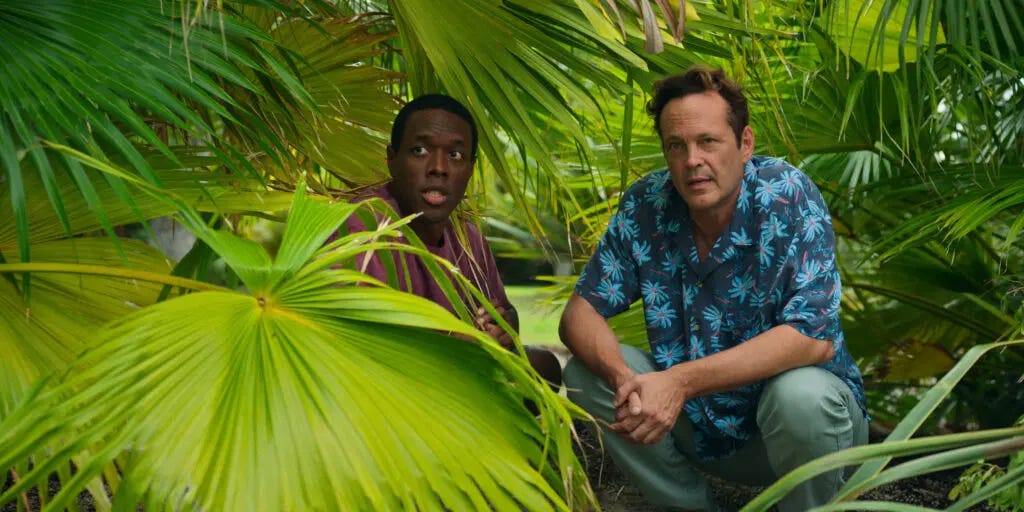A couple of weeks back I sent off a short missive about the problems I see in how the streaming services approach original content, and I briefly touched on AppleTV+ as a focal point. Today, I want to take a look at one specific show: Bad Monkey.
Navigating the Digital Slums
Video stores have proven to be one of the martyrs of the digital revolution that I most wish would return. The whole process of perusing a video library, evoking very similar feelings to walking amongst the stacks in a university library, opened up conversations with other people on a regular basis. And it meant almost always making a discovery that surprised you. By contrast, streaming services don’t offer the same thing.
The show is based on the Carl Hiaasen novel, which I had no previous exposure to when I started watching the Vince Vaughn-led cast. The premise is intriguing. A police officer whose commitment to justice, even in the most simple situations, has landed him in a kind of exile in South Florida. Everyone around him is constantly telling him to leave things alone, to stop asking questions, and to just go along “for once.” He can’t even do this when he’s relegated to a health inspector’s role, shutting down his boss’s favorite restaurant and getting himself in more trouble.
The hook of show is that someone has died and none of the local authorities seem interested. A fishing boat hooks a human arm while out on an excursion, and Yancy (Vince Vaughn) is immediately suspicious. The story follows Yancy as he investigates, after being told not to, and the escalating series of events as he gets closer to figuring out a rather complex series of murders that involve voodoo, the Bahamas, and a peculiar airplane pilot. Along the way, he meets a Miami coroner who starts helping him out. Rosa (Natalie Martinez) has become disillusioned in her profession, and helping Yancy gives her a refreshing way to find meaning in her career.
The show has a superb cast, with Rob Delaney and Meredith Hagner playing the villains with a touch too much perfection, Ronald Peet and Jodie Turner-Smith bring the Bahamas to life in very different roles. Lots of the minor characters turn in great performances as well, with Scott Glenn as Yancy’s dad really bringing the threads of the show together.
I know nothing about Hiaasen and have not read the original book. But I’m confident that the Apple series is different enough for it to be considered as a work on its own. And that brings me back to what I had originally voiced concerning AppleTV+’s programming. I said in that previous piece that Apple has an Ethics Problem.
This Ethics Problem is born, I think, out of two primary issues. 1) The creators of these shows want a Christian ethic, and 2) The creators of these shows reject a Christian ethic.
Bad Monkey seems a prime example of this. The sexual ethic of the shows is horribly confused, with a sort-of condemnation of pedophilia but virtually every other kind of sexual relationship receiving approvals. And the mixture of Obeah culture and the American legal system results in bizarre moments. But the core of the show is that justice is possible. And not only is it possible, but justice is desirable. Yancy’s obsession primarily concerns justice, whether it involves corrupt Miami cops or a Medicare fraudster, he cannot let things go if they are in fact unjust.
MINOR SPOILERS AHEAD
In fact, for all the subplots, twists, and bikini clad women, the show demonstrates a remarkably complex grasp of this essential virtue. I don’t know if any of the characters ever actually use this specific word, but Yancy’s character seems to have an unrelenting pursuit of justice baked into his very core. But of course, it is a limited justice. The idea that justice requires sacrifice, and they individuals must pay for their crimes, means that the show ends with plenty of bloodshed and dead bodies. Though Yancy doesn’t see the sort of restoration that a viewer might expect, there is little doubt at the end of who the just and unjust characters are. In an age of gray heroes and villains, this proves a surprisingly refreshing take.
This concept of blood sacrifice struck me when I watched what was ostensibly a Vince Vaughn dark comedy. And there’s no doubt that Vaughn is at the top of his game here, as Yancy’s approach to life is effortlessly embodied in Vaughn’s off-the-cuff remarks and semi-positive approach to even the worst elements of life. Yet Bad Monkey puts forth the idea that the cost of a life is a life, that crime does not pay, and there is no way to wash guilt out of our lives unless covered by blood. When the Dragon Queen dies, her role as a scapegoat is shocking. She is perhaps the last person who the viewer expected to die for her sins (or the sins of others). And yet it works. Her death brings an unexpected sense of closure and fulfillment to the whole thing. The viewer laments her untimely demise, but doesn’t feel robbed by it. It actually gives her character a meaning that was lacking (though you didn’t necessarily realize it until it happens).
Of course, the Dragon Queen practices Obeah. And none of the other characters in the show demonstrate any sense of Christianity. In fact, the show seems to actively avoid any connections to traditional faiths and how they shape a person’s life. It’s a stark choice in a show that makes lots of religious-type statements, from communing with manatees to speaking with the spirits of the dead. It comes across as very intentional, like insisting there are other options for the basis of justice that don’t need Christ. And the sort of pagan-ness of this emerges in how the show approaches its conclusion. The sacrificial aspect of the show’s deaths allows for temporal justice, but none of the characters seem to be better off in the long term as a result.
This brings me to that Ethics Problem I mentioned earlier. The show demonstrates an earnest desire for justice to reign in the world, and it also recognizes the need for a kind of propitiation. But it refuses to come anywhere close to suggesting that Christianity might provide some kind of key, or even a way forward, and as a result turns towards a pagan faith that hodge podges practices together as the best alternative in a world where people cut off their own arms and housing developers hurt local wildlife.
The sort of cognitive dissonance that comes from these conflicting ethical claims creates a problem for the show. Some sexual activities are bad and harmful, such as the teacher-student mess that happens off screen. But the show definitely wants to maintain a modern, post-Christian ethical approach to virtually every other kind of relationship. But how to separate them all? The show wants to hang it on a kind of age-based line, but this doesn’t seem to help the messed up relationships throughout the rest of the show. And there’s no doubt that the sexual ethic of the characters has led to many of their issues, even if the show doesn’t want to acknowledge this. I guess if a show is interested in the Natural Law, there are some things they simply can’t avoid.
Thus, I don’t know if this is a show that I would recommend. It’s a high quality output, with solid performances, and lots of laughs. But the language (which is foul), the sexual content (which borders on pornographic), and the mixed up morality make it so that I can’t say it’s a show worth everyone’s times. Still, if you’re interested in a show that puts on display the ethical conflicts of our post-Christian culture, I can’t think of a show which better represents it than Bad Monkey. Perhaps that’s a kind of endorsement? I’m not sure.







